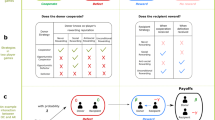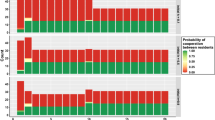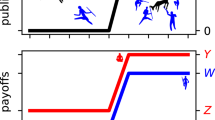Abstract
Human cooperation is an evolutionary puzzle. Unlike other creatures, people frequently cooperate with genetically unrelated strangers, often in large groups, with people they will never meet again, and when reputation gains are small or absent. These patterns of cooperation cannot be explained by the nepotistic motives associated with the evolutionary theory of kin selection and the selfish motives associated with signalling theory or the theory of reciprocal altruism. Here we show experimentally that the altruistic punishment of defectors is a key motive for the explanation of cooperation. Altruistic punishment means that individuals punish, although the punishment is costly for them and yields no material gain. We show that cooperation flourishes if altruistic punishment is possible, and breaks down if it is ruled out. The evidence indicates that negative emotions towards defectors are the proximate mechanism behind altruistic punishment. These results suggest that future study of the evolution of human cooperation should include a strong focus on explaining altruistic punishment.
This is a preview of subscription content, access via your institution
Access options
Subscribe to this journal
Receive 51 print issues and online access
$199.00 per year
only $3.90 per issue
Buy this article
- Purchase on Springer Link
- Instant access to full article PDF
Prices may be subject to local taxes which are calculated during checkout


Similar content being viewed by others
References
Smuts, B. B., Cheney, D. L., Seyfarth, R. M., Wrangham, R. W., & Struhsaker, T. T. (eds) Primate Societies (Univ. Chicago Press, Chicago, 1987).
Richerson, P. & Boyd, R. in Ideology, Warfare and Indoctrinability (eds Eibl-Eibesfeldt, I. & Salter, F.) 71–95 (Berghan Books, New York, 1998).
Sober, E. & Wilson, D. S. Unto Others: The Evolution and Psychology of Unselfish Behaviour (Harvard Univ. Press, Cambridge, Massachusetts, 1998).
Boyd, R. & Richerson, P. in Evolution and Culture (ed. Levinson, S.) (MIT Press, Cambridge, Massachusetts, in the press).
Hamilton, W. D. Genetical evolution of social behavior I and II. J. Theor. Biol. 7, 1–52 (1964).
Trivers, R. The evolution of reciprocal altruism. Q. Rev. Biol. 46, 35–57 (1971).
Axelrod, R. & Hamilton, W. D. The evolution of cooperation. Science 211, 1390–1396 (1981).
Axelrod, R. The Evolution of Cooperation (Basic Books, New York, 1984).
Nowak, M. A., May, R. M. & Sigmund, K. The arithmetics of mutual help. Sci. Am. 272, 76–81 (1995).
Alexander, R. D. The Biology of Moral Systems (Aldine de Gruyter, New York, 1987).
Nowak, M. A. & Sigmund, K. The dynamics of indirect reciprocity. J. Theor. Biol. 194, 561–574 (1998).
Nowak, M. A. & Sigmund, K. Evolution of indirect reciprocity by image scoring. Nature 393, 573–577 (1998).
Lotem, A., Fishman, M. A. & Stone, L. Evolution of cooperation between individuals. Nature 400, 226–227 (1999).
Wedekind, C. & Milinski, M. Cooperation through image scoring in humans. Science 288, 850–852 (2000).
Leimar, O. & Hammerstein, P. Evolution of cooperation through indirect reciprocity. Proc. R. Soc. Lond. B 268, 745–753 (2001).
Zahavi, A. The cost of honesty (further remarks on the handicap principle). J. Theor. Biol. 67, 603–605 (1977).
Zahavi, A. Altruism as a handicap—the limitations of kin selection and reciprocity. J. Avian. Biol. 26, 1–3 (1995).
Gintis, H., Smith, E. & Bowles, S. Costly signalling and cooperation. J. Theor. Biol. 213, 103–119 (2001).
Clutton-Brock, T. H. & Parker, G. A. Punishment in animal societies. Nature 373, 209–216 (1995).
Axelrod, R. An evolutionary approach to norms. Am. Pol. Sc. Rev. 80, 1095–1111 (1986).
Heckathorn, D. D. Collective action and the second-order free-rider problem. Ration. Soc. 1, 78–100 (1989).
Henrich, J. & Boyd, R. Why people punish defectors. J. Theor. Biol. 208, 79–89 (2001).
Ostrom, E., Walker, J. & Gardner, R. Covenants with and without a sword: self governance is possible. Am. Pol. Sci. Rev. 86, 404–417 (1992).
Hirshleifer, J. in The Latest on the Best: Essays on Evolution and Optimality. (ed. Dupré, J.) (MIT Press, Cambridge, Massachusetts, 1987).
Frank, R. Passions within Reason: The Strategic Role of the Emotions (Norton, New York, 1988).
Gintis, H. Strong reciprocity and human sociality. J. Theor. Biol. 206, 169–179 (2000).
Sigmund, K., Hauert, C. & Nowak, M. A. Reward and punishment. Proc. Natl Acad. Sci. USA 98, 10757–10761 (2001).
Fischbacher, U. Z-tree: Zürich Toolbox for Readymade Economic Experiments Working Paper No. 21 (Institute for Empirical Research in Economics, Univ. Zürich, 1999).
Acknowledgements
Support by the MacArthur Foundation Network on Economic Environments and the Evolution of Individual Preferences and Social Norms, and the EU-TMR Research Network ENDEAR is gratefully acknowledged. We also thank R. Boyd, A. Falk, U. Fischbacher, H. Gintis and J. Henrich for comments, and M. Näf and D. Reding for research assistance. We are particularly grateful to U. Fischbacher for writing the computer software.
Author information
Authors and Affiliations
Corresponding author
Ethics declarations
Competing interests
The authors declare no competing financial interests.
Rights and permissions
About this article
Cite this article
Fehr, E., Gächter, S. Altruistic punishment in humans. Nature 415, 137–140 (2002). https://doi.org/10.1038/415137a
Received:
Accepted:
Issue Date:
DOI: https://doi.org/10.1038/415137a
This article is cited by
-
People punish defection, not failures to conform to the majority
Scientific Reports (2024)
-
Discipline and punishment in panoptical public goods games
Scientific Reports (2024)
-
Trusting young children to help causes them to cheat less
Nature Human Behaviour (2024)
-
Engineering Optimal Cooperation Levels with Prosocial Autonomous Agents in Hybrid Human-Agent Populations: An Agent-Based Modeling Approach
Computational Economics (2024)
-
The seeds of success: the pivotal role of first round cooperation in public goods games
Journal of the Economic Science Association (2024)
Comments
By submitting a comment you agree to abide by our Terms and Community Guidelines. If you find something abusive or that does not comply with our terms or guidelines please flag it as inappropriate.



